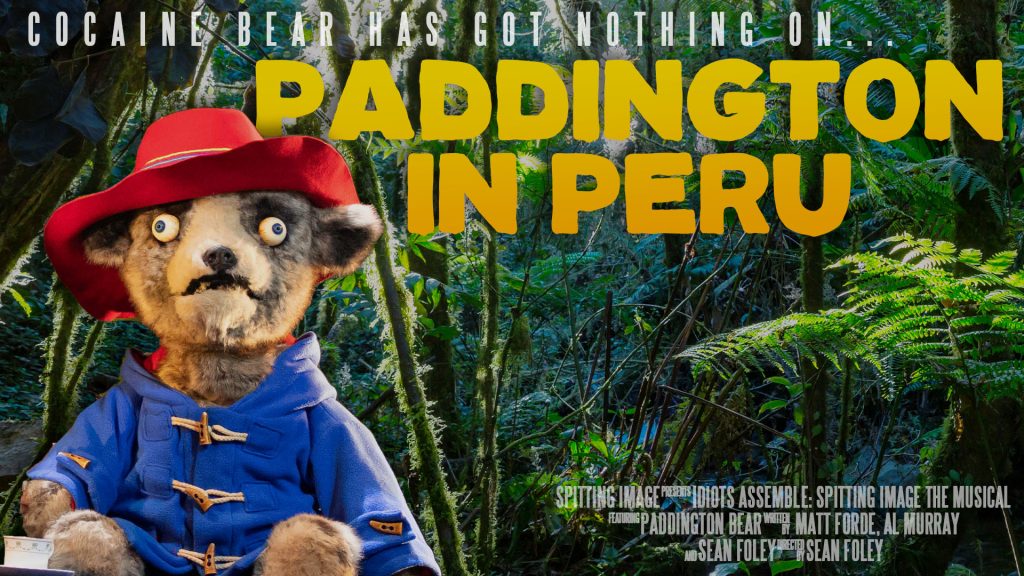We’re going on a bear hunt: Spitting Image challenged over Paddington satire
Rebooted British spoof series Spitting Image came under fire recently from the rights owners of Paddington Bear after the character was featured in a video posted to YouTube in July titled “Spitting Image Presents: The rest is Bulls*!t”.
In the video, a parody of the popular The Rest Is… podcast series, Spitting Image’s Paddington drops his soft-spoken upper-class English accent for something more akin to his native South America whilst swapping the marmalade jam for a pile of suspicious white powder.
Dr Alberto Godionli from the University of Groningen puts forward the question, does the parody actually take aim at the idealised Britishness that Paddington represents?
The mockery looks through the facade of Paddington, described as being the “embodiment of a good immigrant archetype” by James Greig in an article for GQ following the death of Queen Elizabeth II, who famously sat down for tea with the Peruvian immigrant in a YouTube video posted by the royal family in 2022 to mark her Platinum Jubilee. Greig comments on this meeting, writing: “It’s a form of soft monarchism for people who want to buy into a cosy, benign and progressive vision of Britishness”.
Speaking to the Radio Times, Al Murray, one of the comedians behind the latest iteration of Paddington on Spitting Image, slated the legal action as “an attack on comedy” going on to say: “In my experience people find you funny taking the piss out of things, until you take the piss out of something they like. Then they don’t find you funny anymore.”

Spitting Image’s version of Paddington Bear, Photo from Spitting Image/Facebook
This legal attack on English satire that uses the image of a beloved bear harks back to the 1971 obscenity trial against counter-culture magazine OZ involving the character Rupert Bear.
Rupert Bear first appeared in Daily Express comic strips in 1920, depicted as a young bear living in the fictional countryside town of Nutwood which served as an idyllic depiction of an old-fashioned British living.
The case started after the release of OZ’s Schoolkids issue in May 1970, which was the result of an invitation to people under 18 to contribute to, and edit, an issue of the magazine.
Among the offending pieces was one submitted by 15-year-old schoolboy Vivian Berger who had modified a comic strip by American artist Robert Crumb to include Rupert Bear as the main character engaging in an explicit sexual act.
The comic drew attention from the British Obscene Publications Squad, later known for its own corruption, with OZ editors Richard Neville, Felix Dennis and Jim Anderson facing charges including “conspiracy to corrupt public morals” in what became the longest obscenity trial in British history.
Jonathan Dimbleby, reporting from the trial wrote: “It was certainly revealing; not least for the fact that the prosecution conspicuously ignored the bulk of the magazine – some 21 pages of the youthful anti-authoritarian political writing. According to the Crown, neither ‘politics’, nor what the kids thought of ‘the pigs’, were relevant in what was merely a criminal trial.”
Neville, Dennis and Anderson were found guilty and sentenced to up to 15 months’ imprisonment, however the verdict was overturned on appeal.
Rupert, like Paddington, represented a sense of Britishness that amounts to little more than a nostalgic look at a Britain still stuck between the wars, before the end of the British Empire, and before the start of the welfare state and the decline in raw global power which would mark the next 100 years.
Other examples of famous bear characters being used for political satire prove however that this is not a uniquely British phenomenon.
Yogi Bear was the subject of a 2020 Onion headline that read: Heavily Armed Fans Guard Statue Of Yogi Bear In Case It Turns Out He Supported Confederacy, mocking the reaction to the removal of a number of Confederate statues that had occurred across the United States that same year.
And again from the USA, the often-mocked Smokey Bear, with his slogan “Only YOU can prevent forest fires” was depicted in a 2022 Seattle Times cartoon saying “I hate to say it but climate change has beat me”, as part of a comment piece on that year’s wildfires.
In China images of Winnie the Pooh have been used to mock President Xi Jinping and they emerged as a symbol of dissent during protests in Hong Kong. This has led to the removal of images of the bear across Chinese social media, where users had been claiming a visual resemblance between Xi and the bear. The mockery at times included other members of government such as former Hong Kong Chief Executive Carrie Lam being compared to the character Piglet after appearing in an image with Xi.
Political artist Badiucao has used Winnie the Pooh in a series of images mocking Xi’s efforts to censor the character, with the piece “‘Xi’s going on a bear hunt” showing the President holding a rifle over the bear’s corpse.
In Russia the bear has been used to represent the country for centuries and demonstrate Russian strength, even when the bear is seen as tamed. With its sharp teeth and knife-like claws aimed towards Ukraine the bear has reared up again. Not that Russian nationalists mind – and mock-ups of Russian President Vladimir Putin riding a bear are are still shared to bolster his strong man image.

